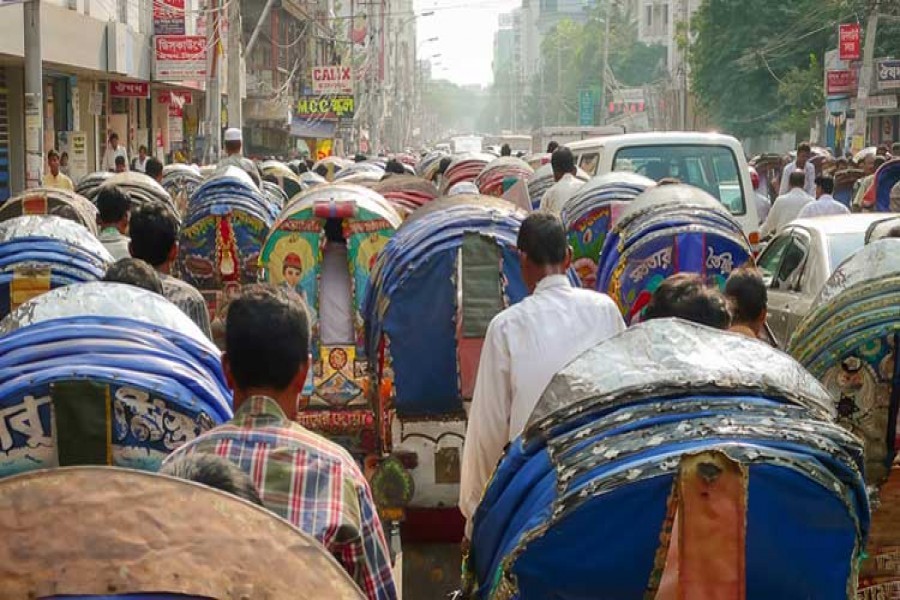
Published :
Updated :

Two city corporations in Dhaka have a habit of selecting a few difficult issues for resolution time and again notwithstanding the fact they had earlier failed on a number of occasions on similar missions.
The eviction of hawkers from footpath is one such problem. The city corporations, the Dhaka South City Corporation (DSCC) in particular, does engage itself in pavement clearing job on a number of occasions in a year. It takes one or two weeks for the hawkers to reoccupy the pavements. There is strong suspicion that the eviction drive is launched with an ulterior motive--- managing a hefty illegal income by the corporation people and the police.
On occasions, the city corporations venture into the task of making certain important roads off-limit for rickshaws. They have limited success in this particular area. So far, they have been able to keep certain roads rickshaw-free under constant watch of the on-duty traffic police. Rickshaws, at times, manage to sneak into those roads also. The Abdul Gani Road is a glaring example. On-duty traffic police and ansars are found to be indulgent to rickshaws defying the ban.
The situation is found to be highly erratic on the road linking the Science Laboratory intersection with the New Market. On this route rickshaws are allowed to use a dedicate lane. But the rickshaws are found all-over the road most of the time, disrupting movement of motor vehicles of all types on the route. The situation has not been satisfactory in the case of other roads that have been declared off-limit for rickshaws.
Amidst such an experience, the NSCC mayor the other day declared three important city routes---from Kuril point to Sayedabad, from Gabtali Bus terminal to Azimpur and Science Laboratory crossing to Shahbagh crossing---rickshaw-free. The ban was made effective from Sunday last. The first day of the ban passed off without any trouble. But on Monday, the rickshaw-pullers in their hundreds took the streets and blocked the traffic movement on the routes that have been declared off-limit for rickshaws. The commuters suffered terribly. The closure of an important route like the Progotani Sarani created severe traffic jam across the city. Many instead of going to their workplaces and other destinations returned home. Students in many places could not go to their schools and colleges.
However, a day's protest was enough for the city corporations to retreat. Rickshaws were back on off-limit roads on Tuesday with no traffic police seen chasing them away like the previous day.
Most people had doubted the success of the latest move of the city corporations. Rickshaws, in fact, have proliferated like anything. A recent survey showed their number at over 1.5 million. The number of rickshaws authorised by the city corporation is less than 100,000 and the rest are illegal ones.
It has become a good business for some people having links with the ruling party to issue number plates carrying names of different organisations. These rickshaws are crowding the city streets. The city corporations have never effectively tried to stop the unauthorised rickshaws from plying the streets and take legal actions against the people behind this illegal business. Now they are trying to contain this menace by imposing ban on rickshaw movement.
The Prime Minister has recently instructed to create separate lanes for rickshaws on important city thoroughfares. This might have partial success, provided rickshaws are made to remain within the dedicated lanes.
Most residents of Dhaka city are aware of the problems that the rickshaws have been causing to smooth traffic movement. But rickshaws have become an integral part of city life because of the absence of vehicles to cover small distances. Most cities even in South Asia do not have rickshaws, but they have more of less an efficient traffic system. It is not that they do not have traffic problems, but it is not as bad as that of Dhaka. It is one of the worst in the world.
Rickshaws have to be taken off the streets. But prior to doing so the authorities have to put in place a workable solution to the city's traffic problem and offer an alternative. Metro rail, dedicated bus service and expressways may help the commuters partially, but any effective cure is not in sight at the moment.


 For all latest news, follow The Financial Express Google News channel.
For all latest news, follow The Financial Express Google News channel.